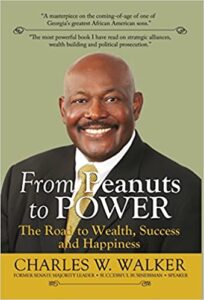Why Entrepreneurship Is Important For Communities, Societies And The Communities Of Americans Of African Descent Especially
Entrepreneurship has been a wealth builder for generations of black people, from the likes of James Forten, Madam C.J. Walker to small and large enterprise owners in the 21st century. However, 8 out of 10 of the over 2 million black-owned businesses in the United States fail within the first 2 years mostly due to the lack of funding. Imagine the benefits gained if, by supporting these businesses, more money was recycled back into the community. By being actively involved in building businesses and supporting black-owned businesses, there’s an unbelievable amount of good it does for these communities where most Americans of African Descent reside.
According to a survey by the US Census Bureau in 2018, employer businesses owned by African Americans accounted for 2.2% of the 5.7 million employer businesses (referring to firms with more than one employee) in the United States, and a total of 7% of businesses in the country if non-employer businesses are included. Out of 26 million small businesses, only 2 million are owned by Blacks, and only about 100,000 of those have employees.
Contrary to belief perpetrated by the media, the low representation of black businesses is not a result of laziness or a lack of will or even gifts and talent, but rather a shortage of sufficient economic and business resources. Another explanation is the hurdles associated with the structural and institutional barriers to the growth and development of black businesses; many created as part of system racism. This low representation has led to a false native that perpetuates the problem and breeds a lack of confidence.
There are a low number of black-owned businesses compared with other businesses. There is also a disproportionately wide racial wealth gap with a household wealth disparity to the tune of $901,000 to $140,000 between white and black families in 2016. This disparity can be traced to the Jim Crow era, where black businesses were vulnerable to targeting and destruction. Consequences of which destroyed the occasion for generational wealth, temporarily tarnishing the entrepreneurial spirit.
The COVID-19 pandemic disproportionately affected black businesses, especially as they were likely to be located in poor business environments putting them in an even more delicate position.
However, the pandemic coupled with the protests by the Black Lives Matter movement may have been the wake-up call necessary to open the eyes of Americans to the extent of the disparities. Solid business structures in the black community with campaigns encouraging the support of black-owned businesses are necessary for the survival of a community, along with better health care, affordable housing, social justice reform, and equality in employment practices.
Top industries for black businesses include health care and social assistance with 39,714 black firms and revenue of $3,446,204 per firm, professional, scientific, and technical firms with 16,392 black firms and revenue of $2,389,497 per firm, and administrative, support, waste management, and remediation firms with 10,136 black firms and $2,729,916 in revenue per firm.
There are still many restrictions relegating black businesses to their local communities (read as institutional racism), limiting their growth. An example is the 2010 Department of Commerce report, which stated that minority-owned businesses experience higher loan denial probabilities and pay higher interest rates than white-owned businesses even after controlling for differences in creditworthiness and other factors. This forces business-minded individuals in the black communities to deduce their only options to less traditional means. Americans of African Descent, for the most part, created the marijuana industry out of necessity. Once it became enormously profitable, the government legalized it and imposed regulatory laws, which they knew would drive blacks out of the prosperous and booming business industry. The question is, why is this allowed? When you talk about preparations, why doesn’t the government impose laws so black business owners can continue, now legally, to operate and dominate this industry, rather than the reverse, which is currently happening now?
Review your history, discover the enormous number of thriving industries created, and developed by Americans of African Descent to be repositioned and credited to others; some listed fortune 500 companies.
The question is will we move to rectify these disparities to black business ownership by creating ecosystems that make it easy for these businesses to expand, as they should. A new lens of consciousness would include having the public, private, and social sectors work together to remove these institutional barriers and view black-owned businesses as essential and necessary to the US GOP, giving them their due credit. Policies and laws can be reviewed, doubling down on eliminating discriminatory laws and enacting new anti-discriminatory ones designed to create opportunities for these businesses to thrive. Supporting black-owned businesses is a step in the right direction to combating racism and creating sustainable economic development for black communities.
Americans of African Descent need to focus a great deal more on legal business ownership rather than seeking a large corporate job or other quick money ventures. It is a case of killing two birds with one stone by tackling black unemployment and closing that wide wealth gap. It is common knowledge black unemployment rates exceed any other group. In June 2012, the black unemployment rate was two times greater than that of whites (due primarily to the loss of jobs in the public sector). Still, it only highlights how much change entrepreneurship could create and how systemic racism fosters these disparities through its regulatory policies.
Black entrepreneurs serve as good role models to youth in their immediate communities by making it clear to these impressionable minds the importance and benefits of hard work and self-efficacy, which discouraging a life of crime and gang violence. Legal business ownership becomes a social buffer shaping how young people view the contributions of black people in the community, education, and government.
Americans of African Descent have fought long and hard for this country. Still, they have reaped very few benefits, for a large part because they are discouraged and prevented from owning businesses. Of course, it goes without saying, entrepreneurship is vital not only locally but also to the growth of the American economy; if black businesses under a more inclusive society increased their revenue to the level of non-blacks, there would be a significant change from an average revenue of $1,031,021 to total increase revenue by $676,356,621,618. In addition to increased revenue, black businesses would provide more jobs, approximately 1.6 million jobs.
In the end, Americans of Africans Descent are not lazy or unable to match up to their white counterparts. Research has shown they are as successful or more than their white counterparts when given equal educational opportunities and resources. Review history to see case after case where they have excel beyond their white counterparts, only to be struck down by racists’ jealousy and increased regulatory practices directed at preventing their success.
Americans’ eyes are open to these unjust practices. A fairer, more just America is on the horizon, a place where all citizens are allowed to live a happy and prosperous life grounded on true equality and justice. The environment must be made more favorable for black businesses to thrive. American citizens will always need to stand firm and strong against corruption, bigotry, and racism to achieve and live according to the principles and values of this nation. Americans have done and continue to vote and do not lose hope in capitalism.

Who Owns the Ice…

Outliers: The Story of…

The Poster Boy: SMALL…

Speed of Trust: The…

The 15 Invaluable Laws…







